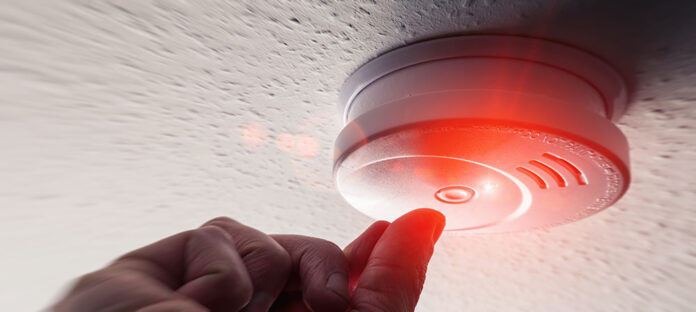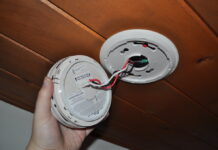
By Al Brandenburg
Most homes in Maricopa are just over 10 years old, and 10 years is the useful life expectancy of the original smoke detectors built into our homes. If you haven’t already replaced your smoke detectors, then it’s time to get serious about doing it now.
You might be diligent about replacing your batteries to quiet the low-battery chirping, but it is important to check the date of manufacture and date of expiration listed on the back side of the detector. If your home is more than 10 years old, the unit most likely has expired and may not sound an alarm if there is a fire even with fresh batteries. Licensed electricians can provide new detectors and install them for you. You can also buy them and install them yourself. They are not expensive.
The easiest solution is to buy exact replacements of the smoke detectors you have now, using the same bases, wiring and connectors. (Remember to turn off the circuit breaker controlling the smoke detector first.) To disconnect the old alarm twist it, and it will drop down so the wires can be disconnected. Then plug in the new unit’s wire connector and twist it onto the base. No tools required.
Consider installing new alarms with 10-year lithium-ion batteries instead of regular alkaline batteries. Whatever way you choose to do it, do it now. It’s time.
Death from carbon monoxide poisoning can occur within minutes. You can help keep your family safe by using a carbon monoxide (CO) detector, which can alert you to the presence of this odorless, silent toxic gas.
Fuel-burning appliances such as gas stoves, gas dryers, gas water heaters and gas furnaces are generally well-designed, tested and safe to use, but over time components can age and get clogged. Should there be a clogged vent or any part of the appliance becomes faulty, hazardous levels of carbon monoxide could be released in your home.
When your CO detector is beeping:
- DO NOT IGNORE the beeping of the alarm.
- Open all windows to get air ventilation
- Turn off any gas appliances
- After the home has been ventilated, reset the carbon monoxide detectors
- If the detectors do not sound the alarm again, to ensure your safety call a qualified technician to inspect and repair any gas problems.
- Should the alarm sound a second time, call 911.
- If the alarm did not go off, but the unit is chirping, replace the battery and check the expiration date inside the unit to see if the unit needs replacing.
If anyone is showing symptoms of CO poisoning:
- Get everyone (including your pets) out of the house immediately.
- Call 911.
- Do not re-enter the home until emergency services has indicated it is safe to return.
CO alarms need replacing every five to seven years. You can get more advice from Maricopa Fire Department at the non-emergency phone number, 520-568-3673.
This column appears in the January issue of InMaricopa.



![Senior Info/Expo draws hundreds Clinical Liason Elaina Young of Compassus Hospice and Palliative Care speaks with an attendee at the Senior Info/Expo at the Maricopa Library and Cultural Center on Jan. 20, 2024. [Monica D. Spencer]](https://www.inmaricopa.com/wp-content/uploads/2024/01/spencer-012024-senior-info-expo-web-01-218x150.jpg)





![He has the power: Weightlifter doesn’t let age or others’ opinions stand in his way Mack Hodges. [Bryan Mordt]](https://www.inmaricopa.com/wp-content/uploads/2023/08/BCM_8517-scaled-e1690992804625-218x150.jpg)





![Affordable apartments planned near ‘Restaurant Row’ A blue square highlights the area of the proposed affordable housing development and "Restaurant Row" sitting south of city hall and the Maricopa Police Department. Preliminary architectural drawings were not yet available. [City of Maricopa]](https://www.inmaricopa.com/wp-content/uploads/2024/04/041724-affordable-housing-project-restaurant-row-100x70.jpg)


